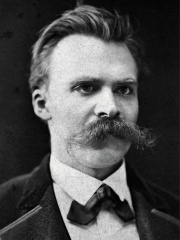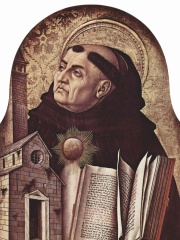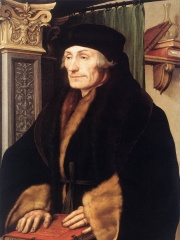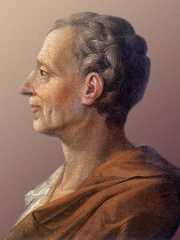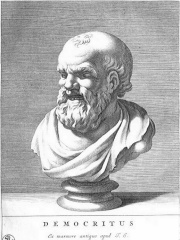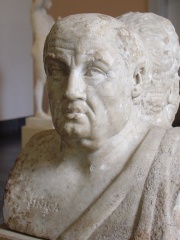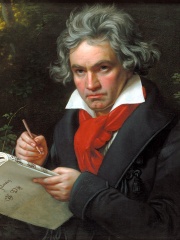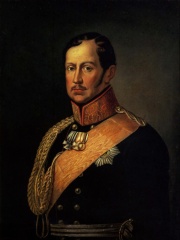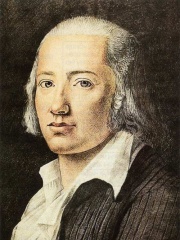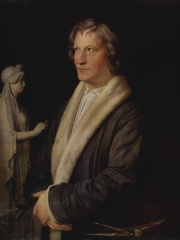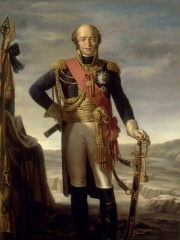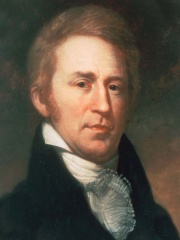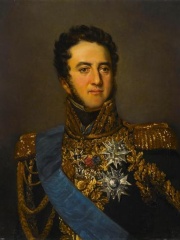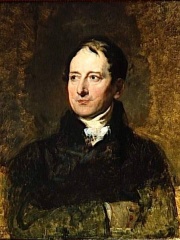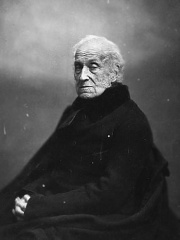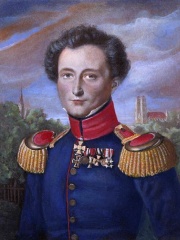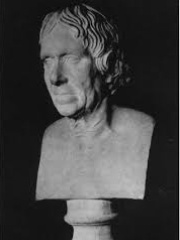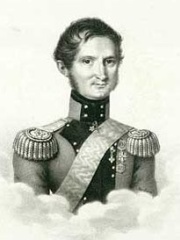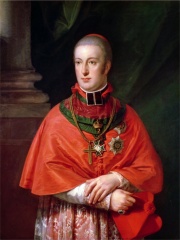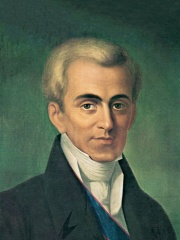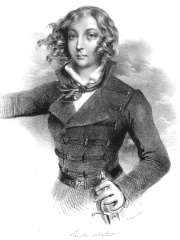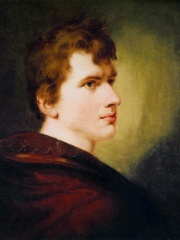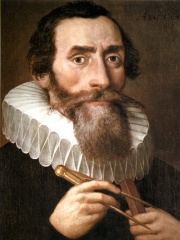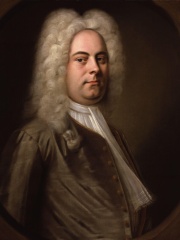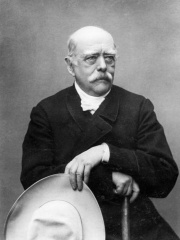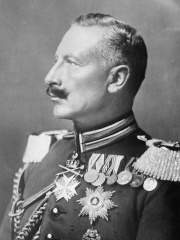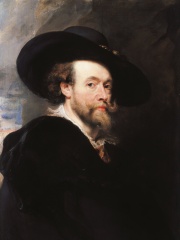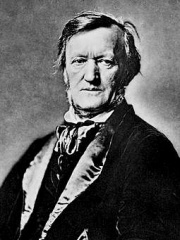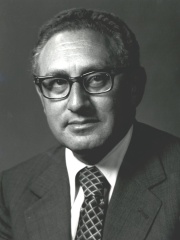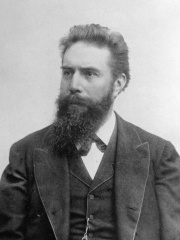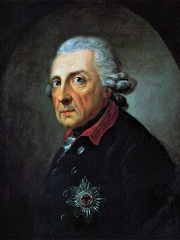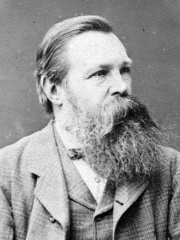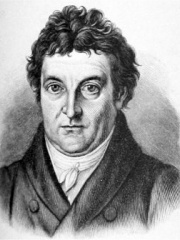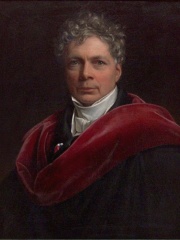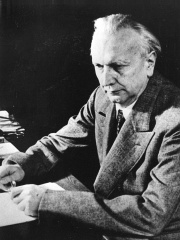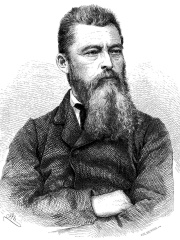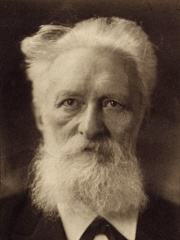PHILOSOPHER
Georg Wilhelm Friedrich Hegel
1770 - 1831

 Georg Wilhelm Friedrich Hegel
Georg Wilhelm Friedrich Hegel
Georg Wilhelm Friedrich Hegel (27 August 1770 – 14 November 1831) was a German philosopher and a major figure in the tradition of German idealism. His influence on Western philosophy extends across a wide range of topics—from metaphysical issues in epistemology and ontology, to political philosophy, to the philosophy of art and religion. Hegel was born in Stuttgart. His life spanned the transitional period between the Enlightenment and the Romantic movement. Read more on Wikipedia
His biography is available in 137 different languages on Wikipedia (up from 132 in 2024). Georg Wilhelm Friedrich Hegel is the 22nd most popular philosopher (down from 19th in 2024), the 21st most popular biography from Germany (down from 15th in 2019) and the 2nd most popular German Philosopher.
Georg Wilhelm Friedrich Hegel is most famous for his dialectical philosophy, which is a system of thought that moves through thesis, antithesis, and synthesis.
Memorability Metrics
Page views of Georg Wilhelm Friedrich Hegel by language
Among PHILOSOPHERS
Among philosophers, Georg Wilhelm Friedrich Hegel ranks 22 out of 1,267. Before him are Friedrich Nietzsche, Thales of Miletus, Heraclitus, Thomas Aquinas, Diogenes, and Erasmus. After him are John Locke, Arthur Schopenhauer, Montesquieu, Democritus, Seneca the Younger, and Epicurus.
Most Popular Philosophers in Wikipedia
Go to all RankingsFriedrich Nietzsche
1844 - 1900
HPI: 90.17
Rank: 16
Thales of Miletus
623 BC - 546 BC
HPI: 89.06
Rank: 17
Heraclitus
535 BC - 470 BC
HPI: 89.05
Rank: 18
Thomas Aquinas
1225 - 1274
HPI: 88.70
Rank: 19
Diogenes
404 BC - 322 BC
HPI: 88.38
Rank: 20
Erasmus
1466 - 1536
HPI: 88.33
Rank: 21
Georg Wilhelm Friedrich Hegel
1770 - 1831
HPI: 88.27
Rank: 22
John Locke
1632 - 1704
HPI: 87.94
Rank: 23
Arthur Schopenhauer
1788 - 1860
HPI: 87.55
Rank: 24
Montesquieu
1689 - 1755
HPI: 87.46
Rank: 25
Democritus
460 BC - 360 BC
HPI: 86.85
Rank: 26
Seneca the Younger
4 BC - 65
HPI: 86.81
Rank: 27
Epicurus
341 BC - 269 BC
HPI: 86.65
Rank: 28
Contemporaries
Among people born in 1770, Georg Wilhelm Friedrich Hegel ranks 2. Before him is Ludwig van Beethoven. After him are Frederick William III of Prussia, Friedrich Hölderlin, Bertel Thorvaldsen, Louis-Nicolas Davout, William Wordsworth, William Clark, Louis-Gabriel Suchet, François Gérard, Princess Elizabeth of the United Kingdom, and Adam Jerzy Czartoryski. Among people deceased in 1831, Georg Wilhelm Friedrich Hegel ranks 1. After him are Carl von Clausewitz, James Monroe, Louis Jean Pierre Vieillot, Sophie Germain, Napoléon Louis Bonaparte, Friedrich Wilhelm, Duke of Schleswig-Holstein-Sonderburg-Glücksburg, Archduke Rudolf of Austria, Ioannis Kapodistrias, Emilia Plater, Achim von Arnim, and Princess Louise of Saxe-Gotha-Altenburg.
Others Born in 1770
Go to all RankingsLudwig van Beethoven
COMPOSER
1770 - 1827
HPI: 96.89
Rank: 1
Georg Wilhelm Friedrich Hegel
PHILOSOPHER
1770 - 1831
HPI: 88.27
Rank: 2
Frederick William III of Prussia
POLITICIAN
1770 - 1840
HPI: 79.70
Rank: 3
Friedrich Hölderlin
WRITER
1770 - 1843
HPI: 78.31
Rank: 4
Bertel Thorvaldsen
SCULPTOR
1770 - 1844
HPI: 74.22
Rank: 5
Louis-Nicolas Davout
MILITARY PERSONNEL
1770 - 1823
HPI: 74.15
Rank: 6
William Wordsworth
WRITER
1770 - 1850
HPI: 74.07
Rank: 7
William Clark
EXPLORER
1770 - 1838
HPI: 72.67
Rank: 8
Louis-Gabriel Suchet
MILITARY PERSONNEL
1770 - 1826
HPI: 70.83
Rank: 9
François Gérard
PAINTER
1770 - 1837
HPI: 70.27
Rank: 10
Princess Elizabeth of the United Kingdom
POLITICIAN
1770 - 1840
HPI: 69.95
Rank: 11
Adam Jerzy Czartoryski
POLITICIAN
1770 - 1861
HPI: 68.65
Rank: 12
Others Deceased in 1831
Go to all RankingsGeorg Wilhelm Friedrich Hegel
PHILOSOPHER
1770 - 1831
HPI: 88.27
Rank: 1
Carl von Clausewitz
PHILOSOPHER
1780 - 1831
HPI: 79.09
Rank: 2
James Monroe
POLITICIAN
1758 - 1831
HPI: 77.90
Rank: 3
Louis Jean Pierre Vieillot
BIOLOGIST
1748 - 1831
HPI: 75.90
Rank: 4
Sophie Germain
MATHEMATICIAN
1776 - 1831
HPI: 75.67
Rank: 5
Napoléon Louis Bonaparte
POLITICIAN
1804 - 1831
HPI: 75.32
Rank: 6
Friedrich Wilhelm, Duke of Schleswig-Holstein-Sonderburg-Glücksburg
POLITICIAN
1785 - 1831
HPI: 73.61
Rank: 7
Archduke Rudolf of Austria
RELIGIOUS FIGURE
1788 - 1831
HPI: 72.87
Rank: 8
Ioannis Kapodistrias
POLITICIAN
1776 - 1831
HPI: 71.62
Rank: 9
Emilia Plater
SOCIAL ACTIVIST
1806 - 1831
HPI: 71.60
Rank: 10
Achim von Arnim
WRITER
1781 - 1831
HPI: 69.71
Rank: 11
Princess Louise of Saxe-Gotha-Altenburg
POLITICIAN
1800 - 1831
HPI: 69.14
Rank: 12
In Germany
Among people born in Germany, Georg Wilhelm Friedrich Hegel ranks 21 out of 7,253. Before him are Johannes Kepler (1571), George Frideric Handel (1685), Joseph Goebbels (1897), Otto von Bismarck (1815), Wilhelm II, German Emperor (1859), and Peter Paul Rubens (1577). After him are Richard Wagner (1813), Karl Benz (1844), Henry Kissinger (1923), Max Weber (1864), Wilhelm Röntgen (1845), and Frederick the Great (1712).
Others born in Germany
Go to all RankingsJohannes Kepler
ASTRONOMER
1571 - 1630
HPI: 89.24
Rank: 15
George Frideric Handel
COMPOSER
1685 - 1759
HPI: 88.95
Rank: 16
Joseph Goebbels
POLITICIAN
1897 - 1945
HPI: 88.81
Rank: 17
Otto von Bismarck
POLITICIAN
1815 - 1898
HPI: 88.67
Rank: 18
Wilhelm II, German Emperor
POLITICIAN
1859 - 1941
HPI: 88.47
Rank: 19
Peter Paul Rubens
PAINTER
1577 - 1640
HPI: 88.29
Rank: 20
Georg Wilhelm Friedrich Hegel
PHILOSOPHER
1770 - 1831
HPI: 88.27
Rank: 21
Richard Wagner
COMPOSER
1813 - 1883
HPI: 88.15
Rank: 22
Karl Benz
INVENTOR
1844 - 1929
HPI: 88.12
Rank: 23
Henry Kissinger
POLITICIAN
1923 - 2023
HPI: 87.92
Rank: 24
Max Weber
SOCIOLOGIST
1864 - 1920
HPI: 87.20
Rank: 25
Wilhelm Röntgen
PHYSICIST
1845 - 1923
HPI: 87.15
Rank: 26
Frederick the Great
POLITICIAN
1712 - 1786
HPI: 85.80
Rank: 27
Among PHILOSOPHERS In Germany
Among philosophers born in Germany, Georg Wilhelm Friedrich Hegel ranks 2. Before him are Friedrich Nietzsche (1844). After him are Friedrich Engels (1820), Martin Heidegger (1889), Hannah Arendt (1906), Johann Gottlieb Fichte (1762), Nicholas of Cusa (1401), Friedrich Wilhelm Joseph Schelling (1775), Karl Jaspers (1883), Ludwig Feuerbach (1804), Rudolf Christoph Eucken (1846), and Jürgen Habermas (1929).
Friedrich Nietzsche
1844 - 1900
HPI: 90.17
Rank: 1
Georg Wilhelm Friedrich Hegel
1770 - 1831
HPI: 88.27
Rank: 2
Friedrich Engels
1820 - 1895
HPI: 85.72
Rank: 3
Martin Heidegger
1889 - 1976
HPI: 84.92
Rank: 4
Hannah Arendt
1906 - 1975
HPI: 82.29
Rank: 5
Johann Gottlieb Fichte
1762 - 1814
HPI: 81.40
Rank: 6
Nicholas of Cusa
1401 - 1464
HPI: 80.39
Rank: 7
Friedrich Wilhelm Joseph Schelling
1775 - 1854
HPI: 80.32
Rank: 8
Karl Jaspers
1883 - 1969
HPI: 80.28
Rank: 9
Ludwig Feuerbach
1804 - 1872
HPI: 80.22
Rank: 10
Rudolf Christoph Eucken
1846 - 1926
HPI: 79.85
Rank: 11
Jürgen Habermas
1929 - Present
HPI: 79.46
Rank: 12
